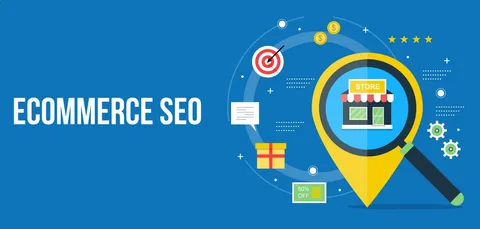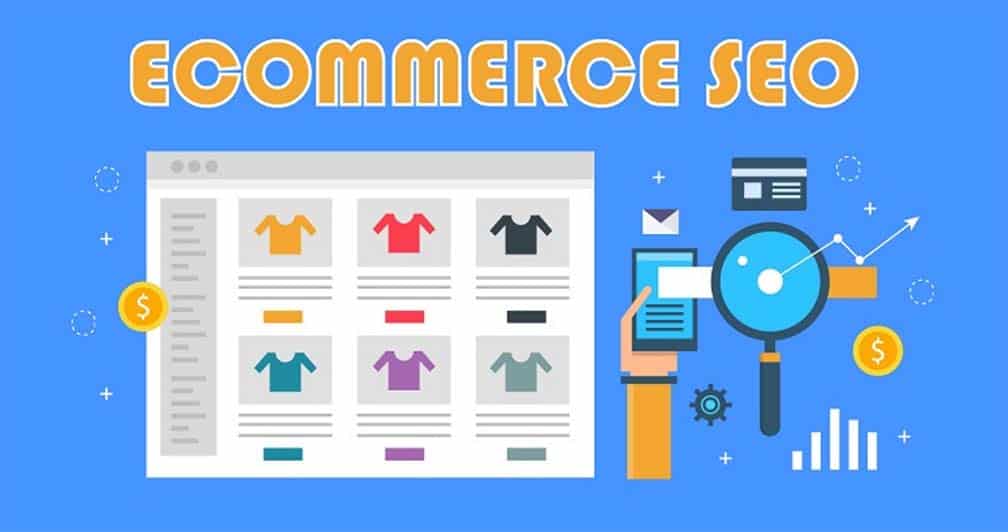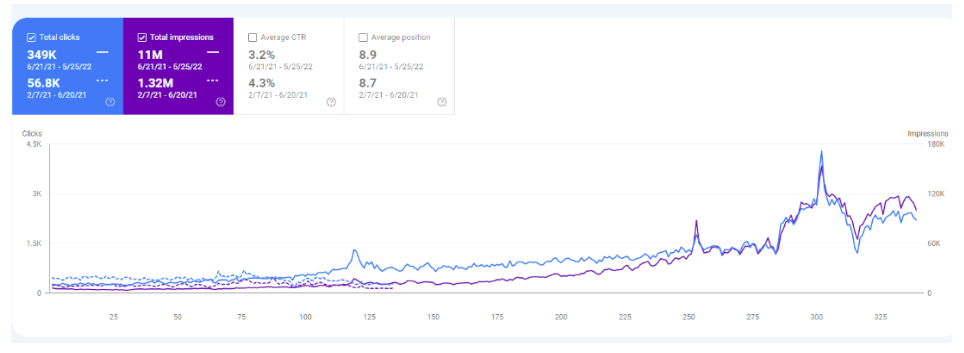In the bustling digital marketplace, where millions of online stores compete for the spotlight, standing out can feel like an impossible challenge.
Yet, amidst the sea of products and promotions, a powerful force exists that can elevate an ecommerce business from obscurity to stardom: Ecommerce SEO Services.
These specialized services are the secret ingredient that can transform a humble online shop into a thriving enterprise.
By weaving together the art of keyword optimization, the science of user experience, and the strategy of technical enhancements, Ecommerce SEO Services unlock the doors to visibility and success.
In this digital age, where every click counts, mastering the nuances of ecommerce SEO isn’t just an option—it’s a necessity.
Let’s explore how these services can be the game-changer your online business needs to soar above the competition and reach new heights.
What is Ecommerce SEO and its importance
Ecommerce SEO is the practice of making your online store more visible in the search engine result pages (SERPs). When people search for products you sell, you want your store to be one of the top results.
Here’s the importance of Ecommerce SEO:
- It aids in increasing the visibility of your online store
- The higher you rank in the SERPs, the more free traffic you get
- This free traffic can then result in more sales
Benefits of Implementing Ecommerce SEO
Implementing an effective Ecommerce SEO strategy has numerous benefits, including:
- Increased website traffic: Proper SEO practices can give your website a significant boost in organic traffic.
- Lower Advertising Costs: With a well-optimized online store, you will spend less on paid advertising.
- Improved Conversion Rate: Traffic from SEO tends to have a higher conversion rate as it is more targeted.
Whether you are a start-up e-commerce store or an established online seller, SEO services can help you reach your business’s potential.

II. Keyword Research for Ecommerce
Understanding the Importance of Keyword Research in Ecommerce SEO
Keyword research forms the foundation of any SEO strategy, but it’s especially crucial in Ecommerce. It refers to the process of identifying popular words and phrases that internet users input on search engines like Google. By optimizing your Ecommerce website for these keywords, you increase its visibility, bring in more potential customers, and enhance your sales.
Tools and Techniques for Effective Keyword Research
When it comes to effective keyword research, various tools and techniques are at your disposal:
• Google Keyword Planner: A free tool that shows the search volume and competition for specific keywords.
• SEMrush: A comprehensive SEO tool that provides keyword analytics, tracking, and even recommendations for content.
• Long-tail keywords: Longer and more specific keyword phrases that can attract targeted traffic to your site.
Don’t forget that good keyword research isn’t just about search volume; it’s also about finding keywords that match the user’s intent.
III. On-Page Optimization for Ecommerce Websites
On-page optimization is a major component in eCommerce SEO services. This aspect involves tweaking elements on your website to enhance its visibility and rank higher on search engines.
Optimizing product pages for search engines
Product page optimization is a key aspect when it comes to on-page SEO. A well-optimized product page not only attracts more traffic but also increases the chances of converting that traffic into sales. Factors to consider when optimizing product pages include use of keywords, clear and concise product descriptions, high-quality product images, and user reviews.
Creating SEO-friendly URLs, meta tags, and product descriptions
SEO-friendly URLs, meta tags, and product descriptions contribute greatly towards improving your site’s search visibility. URLs should be simple, easy to understand, and include relevant keywords. As for meta tags, they should be compelling and include target keywords to attract click-throughs from search engine results pages. Lastly, product descriptions should be easy-to-read, informative, and enriched with relevant keywords.
Remember, the ultimate goal in eCommerce SEO is to improve your site’s visibility, drive more organic traffic, and ultimately, boost your sales. So, invest in a solid on-page optimization strategy to achieve these objectives.
IV. Technical SEO for Ecommerce Websites
Technical SEO has continually become an essential aspect of e-commerce SEO services in 2023. It involves two significant elements that help improve a website’s organic search visibility; that’s optimizing your site structure and navigation and improving website speed and mobile optimization.
Optimizing Site Structure and Navigation for Better Search Visibility
Site structure and navigation are crucial components of any SEO strategy. A well-structured site helps search engines crawl and understand your website, improving your visibility on search results. Here’s how you can optimize it:
- Use clear and concise URLs
- Organize your website’s pages into categories and subcategories
- Include a sitemap to help search engines navigate your site
- Use breadcrumb navigation for effortless user journey.
Improving Website Speed and Mobile Optimization
In our increasingly mobile world, website speed and mobile optimization has become critical in SEO. As page load times increase, so does the chance of users leaving your site, affecting your bounce rate and rankings. Here’s what you can do:
- Compress and optimize your images
- Enable browser caching
- Improve server response time
- Make sure your website design is responsive and mobile-friendly
By focusing on these elements, you can enhance your ecommerce site’s technical SEO, leading to better search visibility and user experience.
V. Content Marketing for Ecommerce SEO
In the realm of ecommerce, integrating content marketing into your SEO strategy is crucial for helping your brand stand out. This section aims to explore two key elements of content marketing relevant to ecommerce SEO.
Creating high-quality and engaging content for Ecommerce websites
High-quality content is the cornerstone of successful ecommerce SEO. Scripting detailed product descriptions, comprehensive-guides, and in-depth articles related to your product or industry can serve as the magnet to attract potential customers. This flavor of content not only grabs the customers’ attention but also helps to boost the visibility of your ecommerce site on search engine result pages.
Utilizing blogs, customer reviews, and user-generated content
To further invigorate your ecommerce SEO efforts:
- Host a user-friendly blog that elaborates on your products or complements them with associated topics.
- Encourage customer reviews as they provide prospective customers with authentic insights and pave an avenue for keyword integration.
- Foster a podium for user-generated content, it not only fortifies customer engagement but also contributes positively to your ecommerce site’s organic visibility.
In essence, with compelling content that nails pertinent keywords, you can create a significant boost for your ecommerce site’s SEO, all while drawing in and delighting potential customers.
VI. Link Building for Ecommerce SEO
For any SEO strategy, including Ecommerce, link building plays a pivotal role. It involves generating quality backlinks from other websites to your own, to improve its authority and relevance in search engine rankings.
Building quality backlinks to improve search rankings
Quality over quantity is a long-aged SEO mantra and it’s particularly true for link building. The focus is not only to get a high volume of backlinks but to acquire high-quality ones from reputable sites. These are the links that impact search rankings positively.
Focusing on relevant and authoritative websites
Link building involves getting backlinks from websites that are both relevant and authoritative in your business niche. Links from irrelevant or non-authoritative sites can be more harmful than beneficial. Aim to build relationships with authoritative sites within your industry to acquire beneficial backlinks.
Here are key points to remember:
- Quality Over Quantity: More isn’t necessarily better in link building. One link from a highly reputable source can outweigh numerous links from lesser-known sites.
- Relevance: Links should come from websites related to your business segment. The more relevant, the better.
- Authority: Aim to get backlinks from highly authoritative sites, as these carry more weight in search engine algorithms.
Overall, a strategic approach to link building can significantly elevate your Ecommerce SEO efforts.
VII. Local SEO for Ecommerce Businesses
Local SEO is key to attracting a targeted audience and improving the online visibility of any e-commerce business. Let’s delve into how to optimize for local search results and make use of beneficial tools such as Google My Business and local directories.
Optimizing for Local Search Results and Target Audience
Local SEO is a crucial base for any E-Commerce venture wanting to attract local consumers. This is because it’s not just about appearing in search results, it’s about appearing in the right ones that target your relevant audience. This requires:
•Localization of content: including geographical keywords relevant to the business locale in all online materials.
•Customer reviews: Encouraging reviews from local customers to improve authenticity and build trust.
Utilizing Google My Business and Local Directories
Google My Business can have a profound impact on local SEO. It helps businesses appear in local search results and Google Maps. Setting up a detailed profile can improve visibility significantly.
Additionally, utilizing local directories, such as Yelp or TripAdvisor, can further extend your reach especially if the directories are commonly used within the local community. Your business should be listed in as many relevant online directories as possible with updated, consistent information.
In conclusion, implementing these local SEO strategies will support a strong foundation for attracting local customers, often leading to increased foot traffic and sales.
VIII. Ecommerce SEO Analytics and Measurement
When considering SEO for your ecommerce business, you can’t ignore the importance of tracking progress and results. With ecommerce SEO analytics and measurement, you will know what is working for your online store and what items require tweaking. Here are some aspects to focus on:
Tracking and analyzing key metrics for Ecommerce SEO success
Key metrics are essential in understanding how well your SEO strategies are working. They include:
- Organic traffic: The number of visitors coming to your site through search engines.
- Bounce rate: How quickly visitors leave your site after landing on it.
- Conversion rate: The percentage of visitors who make a purchase.
Using tools like Google Analytics and Search Console
Google Analytics and Google Search Console are essential tools for tracking your ecommerce SEO success. Google Analytics shows you detailed data on how users interact with your site, while Google Search Console gives insights into your site’s visibility on Google search. Utilizing these tools, you can measure your SEO efficacy and identify opportunities for improvement.
In conclusion, measuring ecommerce SEO is an ongoing task that requires the use of effective tools and analysis of key metrics. It’s essential to regularly check these numbers to adjust your strategies accordingly and optimize your site’s visibility and conversion rates.
Read More : How we have Increase Organic Traffic By 400% By SEO
IX. Ecommerce SEO Best Practices and Strategies
Ecommerce websites face unique challenges when it comes to SEO. To ensure visibility and stay competitive in the bustling online marketplace, consider these best practices and strategies.
Implementing effective SEO strategies specific to Ecommerce websites
Use detailed, keyword-rich product descriptions: Rich descriptions not only provide necessary information but, when optimized with keywords, they help search engines understand your content.
Optimize product images: Use high-quality images and include descriptive alt text with keywords to improve SEO ranking.
Tips for staying ahead in the competitive Ecommerce market
Maintain a (Mobile-friendly) Website: A significant portion of online shopping takes place on mobile devices. Ensure your site is mobile-friendly.
Implement Schema Markup: This helps search engines understand your content better, improving visibility and click-through rates.
Choosing the right Ecommerce SEO practices and strategies could mean the difference between getting lost in the shuffle and rising to the top of the search results. Happy optimizing!

X. Choosing the Right Ecommerce SEO Agency
Choosing the right SEO agency for your ecommerce business can dramatically impact your online presence, search engine ranking, and ultimately, your sales. How to do so? Well, read on to find out!
Factors to consider when selecting an Ecommerce SEO service provider
Several factors are worth considering when looking for an Ecommerce SEO agency:
Experience in Ecommerce: The agency should have a robust portfolio demonstrating their successful SEO campaigns in ecommerce.
Customized Strategy: Every ecommerce business is unique – the SEO agency should provide a tailored strategy that aligns with your specific needs and goals.
Here’s a short list of key features to look for in an SEO agency:
- Comprehensive SEO services
- Transparent reporting
- Ecommerce-centric approach
Questions to ask and key features to look for
Be sure to ask potential SEO service providers these essential questions:
- What SEO strategies do they recommend for your business?
- How do they measure success?
- Can they provide case studies or examples of their work?
By carefully considering these factors, asking pointed questions, and seeking an agency with a strong track record, you can select a partner that meets your ecommerce SEO needs.
Read more : SEO Case Study: How we had increased Sales 240% For an Ecommerce website
FAQS
What are ecommerce SEO services?
Ecommerce SEO services involve strategies and techniques aimed at improving the search engine visibility and organic rankings of an ecommerce website. These services optimize various elements such as product pages, URLs, meta tags, site structure, content, and backlinks to increase organic traffic and drive more sales.
How do I SEO for an e-commerce website?
To optimize an e-commerce website for SEO, you can start by conducting keyword research to identify relevant keywords for your products. Then, optimize your product pages with these keywords in titles, descriptions, and content. Improve your site’s user experience and navigation, ensure fast loading times, and optimize URLs and meta tags. Additionally, create high-quality and unique content, build authoritative backlinks, and utilize technical SEO techniques.
Which ecommerce is best for SEO?
There are several e-commerce platforms that offer good SEO capabilities. Some popular options known for their SEO-friendliness include Shopify, WooCommerce (WordPress plugin), and BigCommerce. However, the best platform for SEO ultimately depends on your specific business needs, budget, and technical expertise.
Is SEO good for ecommerce?
es, SEO is highly beneficial for ecommerce. By implementing effective SEO strategies, you can improve your website’s visibility in search engine results, attract targeted organic traffic, and increase the chances of converting visitors into customers. SEO helps to enhance your online store’s credibility, reach a wider audience, and ultimately drive more sales and revenue.
Is Shopify good at SEO?
Yes, Shopify is considered to be a platform that offers good SEO capabilities. It provides built-in features and tools to optimize your online store for search engines. Shopify allows you to customize meta tags, URLs, and title tags, and provides options for adding alt tags to images. It also offers easy integration with third-party SEO apps and provides a user-friendly interface to manage SEO-related aspects of your online store.
Is SEO worth it on Shopify?
Yes, SEO is worth it on Shopify. Implementing SEO strategies on your Shopify store can significantly improve your website’s visibility in search engine results, drive organic traffic, and increase the chances of attracting potential customers. By optimizing your store’s SEO, you can enhance its online presence, improve conversions, and ultimately achieve long-term success in the competitive e-commerce landscape.

